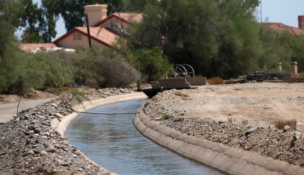Divided Families: Divided family serves church south of border
Arizona Capitol Reports Staff//April 11, 2008//[read_meter]
Divided Families: Divided family serves church south of border
Arizona Capitol Reports Staff//April 11, 2008//[read_meter]
SAN LUIS RIO COLORADO, Mexico — On a Sunday morning at Templo Mikedash, it’s hard to miss the Zavala family.
Efrain, 22, sings and plays his guitar as part of the Methodist church’s band. His brother Damian, 21, leads the congregation in prayers. Another brother, Saul, and their mother, Isabel, sing and pray along.
The family started attending Templo Mikedash while living in San Luis Río Colorado, the Mexican border town that’s home to this congregation of about 100. And they still attend, even though they now live across the U.S.-Mexico border in Somerton.
“We have a Methodist church just like five minutes away from our house, but we have to drive 20 minutes to come here to this church,” Damian said. “We have a place to stay here, and we feel like this is our home.”
The Zavalas’ ties to their church and their past have led them to live a life that is itself divided by the U.S.-Mexico border.
During the week, the Zavalas spend most of their time in Arizona. The weekends are spent in Mexico.
Saul is a junior at Kofa High School in Yuma. Efrain takes classes at Northern Arizona University’s Yuma campus. Damian takes classes at the same campus and also works as a delivery driver for Coca-Cola.
Their father, also named Efrain, repairs farm equipment around the agriculturally focused southwestern region of Arizona.
They have been in the United States for about five years, settling here after a long trek from Obregon, a city in the southern part of the Mexican state of Sonora, more than 250 miles south of the border.
“There was work,” the elder Efrain said in Spanish. “But little money.”
So Efrain found work in Arizona, and soon afterward his family moved to San Luis Río Colorado to make it easier for him to visit on weekends. The family submitted paperwork and waited for almost a decade before being allowed to move to the United States in 2001.
They are happy to be here, but in many ways, Isabel and the children feel more at home in Zavala, where the children grew up and where everyone speaks Spanish.
“My mom (only) speaks Spanish,” the younger Efrain said in Spanish. “It’s more complicated (in Arizona) because of the language.”
So every Friday night — after the elder Efrain gets paid for the week and after Saul gets out of school — Isabel and the children drive the 10 miles back across the border to their second home in Zavala — and to church.
Damian looks forward to seeing one fellow church member in particular — his wife, Daniela Burruel, 22.
Damian said he and Daniela were in the same church group for young people. “The first time that I saw her, it was here in the church,” he said in Spanish. “But we didn’t talk.”
It was only when Daniela was injured and Damian went to visit her in the hospital that he really got to know her.
The couple was married in the summer of 2006 and since then, they’ve spent much of their marriage living on opposite sides of the U.S.-Mexico border.
“Of the seven days of the week, we have four or five together,” Damian said. “It isn’t easy.”
Daniela can’t visit Damian in Arizona because she isn’t eligible for Mexican travel documents. “My wife, she doesn’t work, she’s not going to school right now, and we don’t have any property here,” Damian said. “We don’t want it to be like this, going and coming all the time.”
Daniela used to work in a pharmacy, but she now spends her days sewing, reading and watching television. “I spend a lot of time alone,” Daniela said in Spanish.
Damian said he spends more time in Mexico than the rest of his family, but he limits his trips because he is a permanent resident, not a citizen, of the United States and doesn’t want to endanger the status of his green card by spending too much time in Mexico.
But on Sundays, Daniela and Damian sit together in church.
Their firstborn child is on the way, as is a wedding ceremony. They were married in 2006 in a small civil ceremony, but they’re planning a full ceremony with family and friends at Templo Mikedas.
Meanwhile, they have this: Sunday afternoons and evenings as a family.
The elder Efrain often drives to meet the rest of the family on Sunday afternoons when he’s done with work. He leaves his car on the U.S. side of the border to avoid the long lines, and walks across, joining up with the rest of the family for a movie, to go out to eat or just sit and talk in their San Luis Río Colorado home.
But by the early hours of Monday morning, the family again finds itself straddling two cities, two states, two countries.
Damian said he sleeps only a few hours each Sunday night in an attempt to get to work by 5 a.m. The wait time at the border can be as long as five hours, so he often leaves in the middle of the night.
He said he looks forward to time when he won’t have to spend days at a time with an international border between him and his wife.
“We’ll move to New York, L.A. — who knows, be movie stars,” he joked. “But right now we’re stuck here.”
He thinks back to the years it took for his family to be accepted as legal residents of the United States, and it gives him patience. He’s confident he’ll pass the citizenship exam and that Daniela will soon be able to live with him in Arizona.
“I don’t want it to be more than two years,” he said, “but I have to wait. We have to wait.”
















